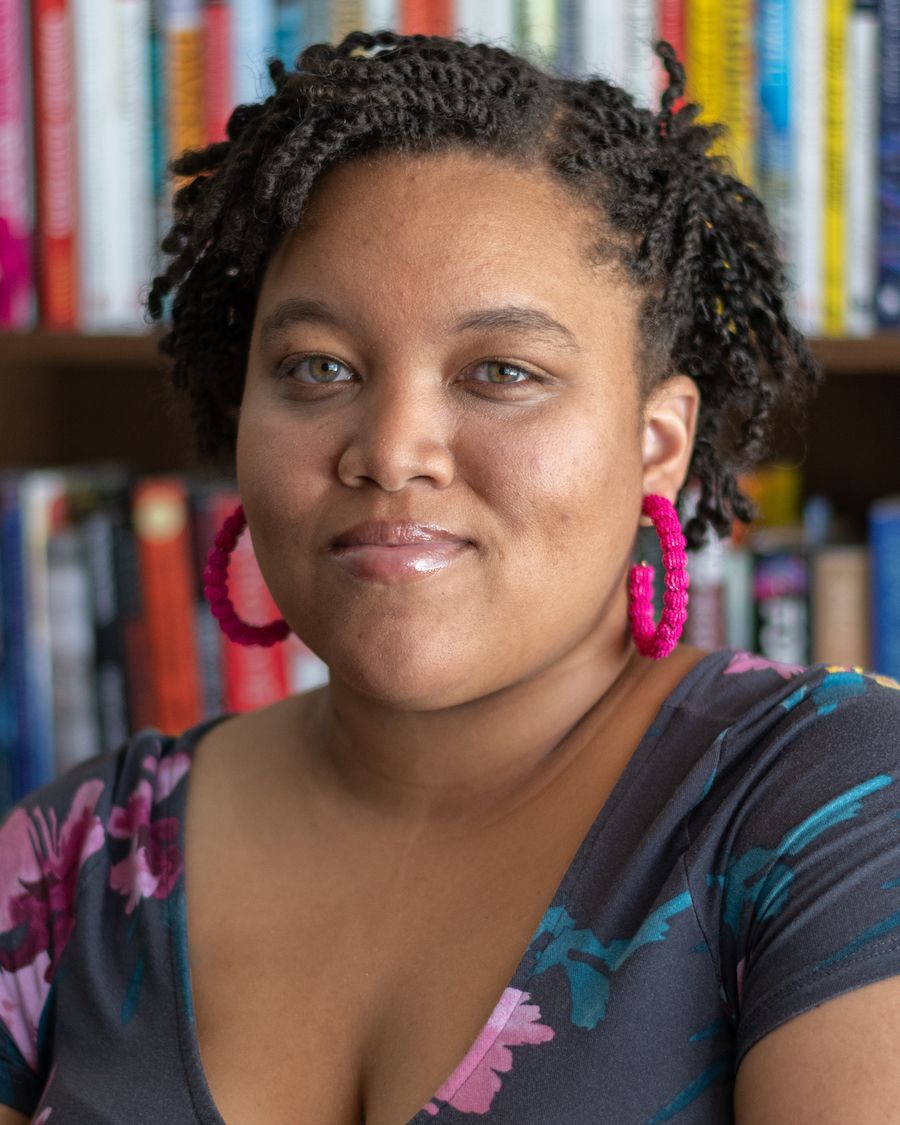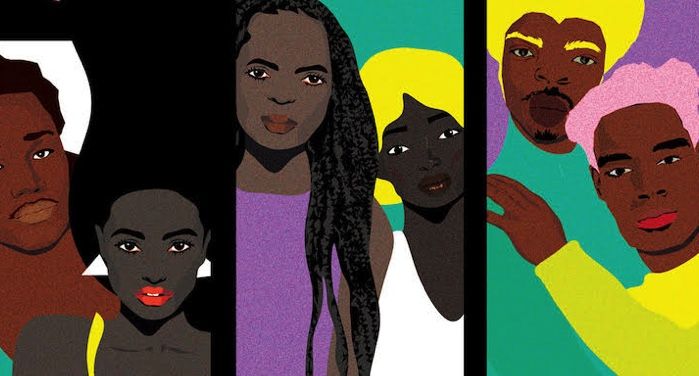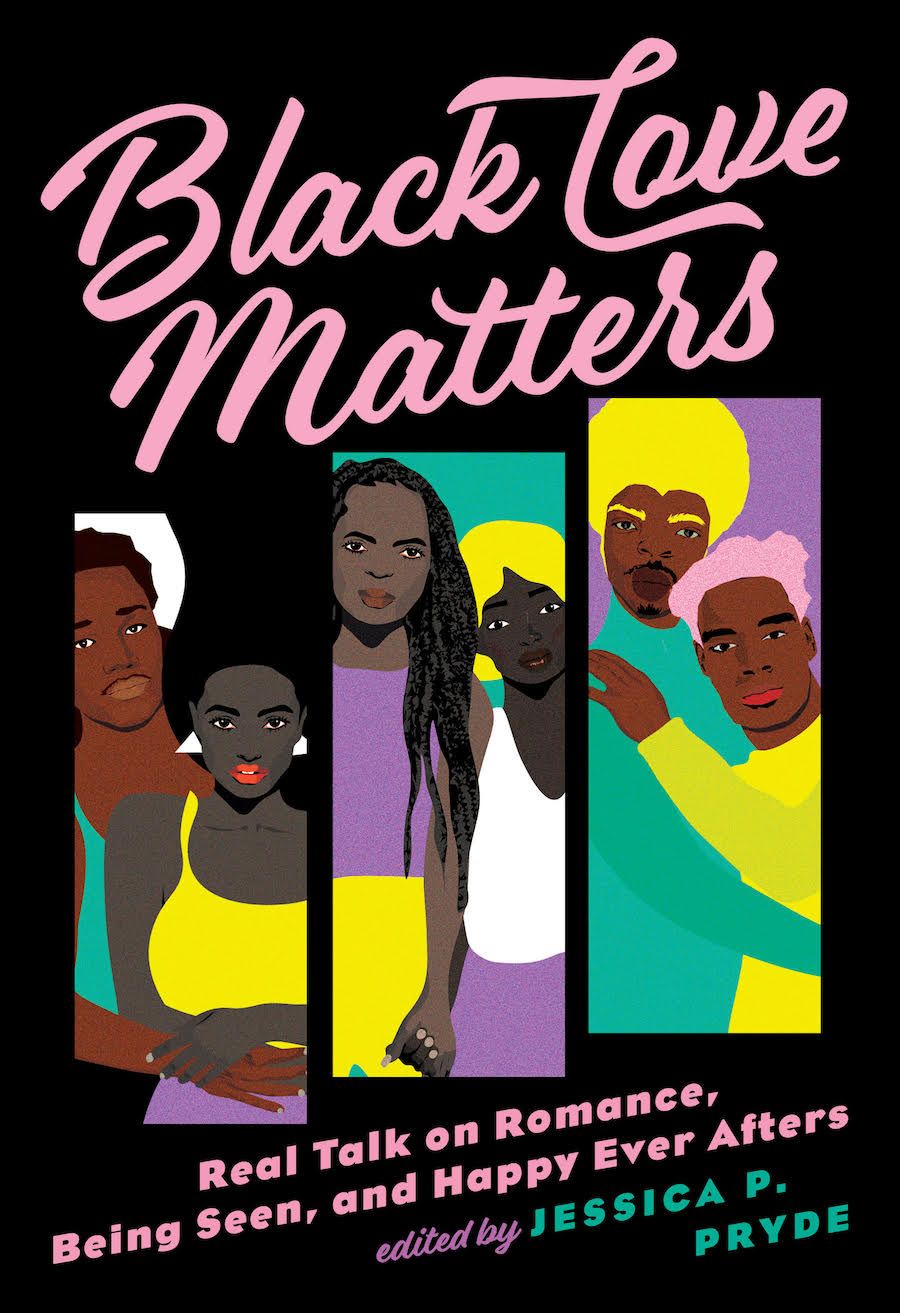Gather ’round, romance readers! Get ready for an incisive, intersectional essay anthology that celebrates and examines romance and romantic media through the lens of Black readers, writers, and cultural commentators. We’re so excited to bring you the cover reveal for Black Love Matters edited by Book Riot’s own Jessica P. Pryde, out February 2022! Mark your calendars now and check out the synopsis below, then keep scrolling to learn more about the inspiration behind the anthology from Jess herself and read an excerpt from the book:
Romantic love has been one of the most essential elements of storytelling for centuries. But for Black people in the United States and across the diaspora, it hasn’t often been easy to find Black romance joyfully showcased in entertainment media. In this collection, revered authors and sparkling newcomers, librarians and academicians, and avid readers and reviewers consider the mirrors and windows into Black love as it is depicted in the novels, television shows, and films that have shaped their own stories. Whether personal reflection or cultural commentary, these essays delve into Black love now and in the past, including topics from the history of Black romance to social justice and the Black community to the meaning of desire and desirability.
Exploring the multifaceted ways love is seen—and the ways it isn’t—this diverse array of Black voices collectively shines a light on the power of crafting happy endings for Black lovers.
Jessica Pryde is joined by Carole V. Bell, Sarah Hannah Gomez, Jasmine Guillory, Da’Shaun Harrison, Margo Hendricks, Adriana Herrera, Piper Huguley, Kosoko Jackson, Nicole M. Jackson, Beverly Jenkins, Christina C. Jones, Julie Moody-Freeman, and Allie Parker in this collection.

When I was eight years old, I used to pretend the kiss on the tarmac was the final scene of The Bodyguard. The giant swell of Whitney Houston’s powerhouse version of “I Will Always Love You” made the perfect fade-out for my reimagined ending to the 1992 movie—one where bodyguard Frank Farmer doesn’t move on to another job, recovering from the bullet he took, and Oscar-winner Rachel Marron doesn’t literally fly off into the sunset, future unknown.
I rewrote a lot of endings growing up.
For Black people, especially in the United States, a happily ever after hasn’t always been easy to come by. The idea for this collection sprung fully formed from an essay (okay, a tirade) about the place of Black romance readers in the greater scope of the world. What had other romance readers in my position experienced? How does the need for a Happily Ever After affect us all, no matter our own background or current situation? Eventually, my curiosity broadened beyond romance novels, to other forms of media as well.
No Black consumer is the same, but each of this collection’s contributors—be they author, reader, critic, or all three—has experienced a similar awakening to the importance of the HEA, whatever that looks like, for people of all kinds. And in the end, it comes down to this: there is something utterly transformative about being exposed to Black love—whether in a book, on a screen, or in real life.
And now an excerpt from Kosoko Jackson’s essay, “Please, Sir, Can I Have Some More: How Breadcrumbs Of Queer Characters In Entertainment Helped Me Establish My Own Sense Of Self.”
Being queer is hard. Navigating the world as one minority is a difficult thing, but as a double minority? Even harder. There’re a lot of people trying to box you into a specific category and try to help you decide who you are. Trying to understand what it means to be Black and what it means to be queer, growing up and even as an adult, has never been the easiest thing. I jokingly say it’s like my third or fourth job. There definitely was a time in my life when I thought I could only be Black, or that I could only be queer.
But like what often happens with age, you learn more about yourself and learn more about the world around you. I am who I am as a person—still evolving, still changing, still growing—because of my family, because of my friends, because of what I consume. Sometimes I wonder how different I would be if I’d been born thirty or forty years in the past. What type of person would I be if I didn’t have the assistance of some of the characters who have been my safe havens—my educators, my teachers, and my friends as they grow older? What we absorb as entertainment has a direct effect upon who we are as a person. That’s why it’s so important that we have characters, especially marginalized ones, that are authentic.
Authentic doesn’t mean sugarcoating, where it only shows the good, and it most certainly doesn’t mean traumatizing to only show the bad. There is space in our cinema for both. And oftentimes characters can—and should—personify both the good and the bad, because that reflects the real world. Content creators have a responsibility, even if they don’t want to admit it, to create characters that in some way, especially for content that targets teens, help them understand this complicated experience: their life, known as being a teenager. Many studies have shown that the teenage years are the most important years for development. So why don’t we try to help guide them through these complicated times as much as possible?
Growth also doesn’t stop when we turn twenty. In fact, I’d argue I grew more during my twenties than I did in my teens. Not because life was harder or more fruitful but because I knew more about myself and who I wanted to be in my twenties than I did in my teens. I’m glad I had these characters to help me grow, and as an author, I hope to create characters that’ll help other twentysomethings or teens grow, too.
That’s why I do what I do. I think if you asked me a month or even a year ago about why I write queer Black characters in love stories, in thrillers, in quiet adventures, I would have told you: Because it feels right. But I wouldn’t exactly know why. This is why. I write these stories because Black queer characters have helped teach me things about myself, and still do to this day. I write and create these characters not only in the hopes of increasing representation of queer Black voices in media, but also in the hopes of making a character who will help change other young adult’s lives. Someone who they can imprint on and use as a blueprint for their personality. Someone they can use as a catalyst to help get them through a rough patch in their life. As a writer, as a member of the global community, and as someone who wants to make their mark, there is no bigger joy.
From Black Love Matters edited by Jessica P. Pryde. Used with the permission of the publisher, Berkley. Copyright © 2022 by Jessica P. Pryde.

